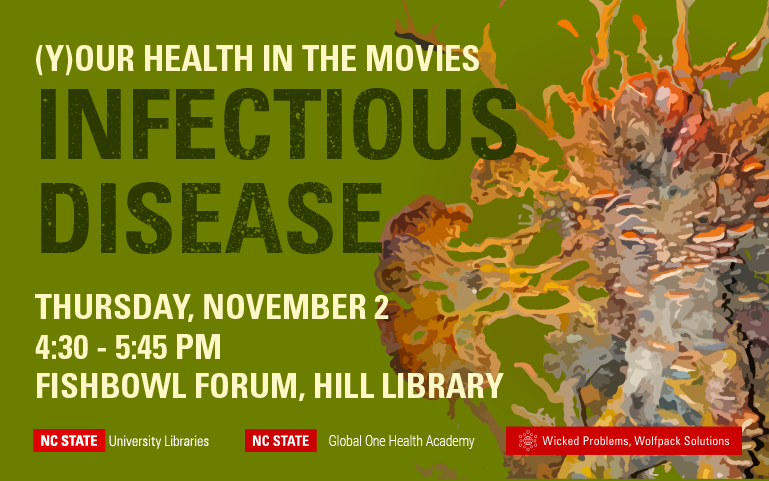
(Y)Our Health film and discussion series debuts Nov. 2.

(Y)Our Health film and discussion series debuts Nov. 2.
If you breathlessly binge-watched “The Last of Us,” then come to the Libraries for a lively event on Nov. 2.
In the first of three film and discussion events this academic year, NC State scholars and scientists will screen clips from the show and talk through the science behind depictions of infectious disease in popular culture.
The (Y)Our Health event series builds upon this year’s Wicked Problems, Wolfpack Solutions course, (Y)Our Health. The course focused on One Health—the idea that the health of people is connected to the health of animals, plants and biodiversity. Each event in the series focuses on how One Health themes are depicted in popular culture through film, television, and video games. These events promise to be fun and informative and will feature experts in both science and film/television from the NC State community.
A growing human population, changes in climate and our closer relationships with animals impact the health of the environment, affect food and water supplies and make it easier for diseases to spread between animals and people. NC State’s Global One Health Academy tackles shared health threats by looking at all angles—plant, animal, biodiversity, environmental and human—and is a co-sponsor for this series.
The (Y)Our Health events are as follows:
Infectious Disease
Thursday, Nov. 2, 4:30-5:45 p.m., Fishbowl Forum, Hill Library
Could a fungal pathogen really turn humans into zombies, as depicted in the popular video game and television series, The Last of Us? What is the likelihood of a fungal pandemic actually happening? Join infectious disease experts Skylar Hopkins and David Rasmussen and film studies professor Marsha Gordon in a discussion of the science behind depictions of infectious disease in popular culture.
Climate Change
Thursday, Jan. 25, 4:30-5:45 p.m., Fishbowl Forum, Hill Library
Earth’s climate is warming, storms are becoming more extreme and the ocean is rising. While this reality has only recently begun to sink in to the popular imagination, films have been depicting potential dystopian outcomes of climate change for a long time. Join climate change experts and ecocinema professor Jorge Marí in a discussion of the science behind depictions of climate change in film. We’ll look at these films in light of recent knowledge and consider actions we can take to achieve a more hopeful future for humans, animals and plants alike.
Food and Water
Tuesday, March 19, 4:30-5:45 p.m., Fishbowl Forum, Hill Library
How will we produce enough food for a growing population and distribute it equitably? How will we deal sustainably with the wicked problems of human waste and securing access to safe water and sanitation? Join food, water and film experts in a discussion of the science behind depictions of food and water problems in popular movies. We'll discuss these films alongside emerging technological solutions and innovations that work toward a secure future for our food and water.